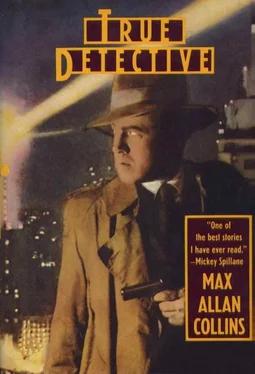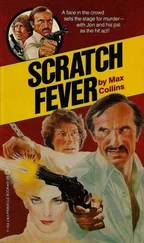The sheriff gave him the name of the mortuary.
The lawyer nodded, said, “We’ll be in touch,” and got in his Cadillac and drove off.
The man in the cap and brown jacket was still over by his flivver, standing first on one foot, then the other. He said, to no one in particular, “Where’s the reporters, anyway?”
“Stick around,” Eliot said, and advised the sheriff the same thing, then nodded to me and we walked back to his Ford.
“Aren’t you going to wait for the press, Eliot?” I asked him.
He shook his head no. “This is nothing I want to be part of. You, either.”
On the way back to Chicago, Eliot said, “That’s Nitti’s work, of course. So much for Ted Newberry as the mayor’s handpicked candidate for running gambling on the North Side.”
“That still leaves Touhy in Cermak’s pocket.”
“Touhy’s nothing. Nitti’s made an important point here. Newberry offered fifteen thousand for Nitti dead. Well, Nitti’s alive and Ted isn’t.”
“I wonder how Cermak’s favorite bodyguards will take the news of Newberry taking a ride.”
Eliot smiled a little. “I wonder how Cermak will take it.”
“Why’d you want me to see that, anyway?”
Eliot, watching the road, said, “It concerns you.”
“Sure. But you could’ve phoned and told me about it. Why’d you want me along? Outside of me being charming company.”
“Newberry was Cermak’s man.”
“So?”
“He’s nobody’s man, now.”
“Point being?”
He glanced at me, then back at the road. The dunes were still around us: it was like the Midwest was doing a bad but impressive imitation of Egypt.
Eliot said, “Maybe this opens the door for you telling a different story at the Nitti trial.”
“Like the true story, you mean.”
He shrugged. “You might want to consider it. Newberry’s an example of how Nitti operates. And Newberry’s also an example of Cermak’s current lack of strength in mob circles.”
“So, what? You’re saying if I stick with Cermak’s team, I’m ditch-bound? That’s bullshit, Eliot. Nitti knows I’m an innocent bystander in this. You notice that was Newberry dead back there, not Lang or Miller. Frank Nitti doesn’t kill the messenger; he kills the guy who sent the message.”
Eliot just drove.
I kept talking. “Just because Cermak isn’t aligned with a gang of any power, at the moment, doesn’t mean he isn’t going to be again, soon. He’s been playing this game a long time, you know. And if I cross Cermak, I’ll get my op ticket, and my gun permit, pulled. Get serious, Eliot.”
Eliot didn’t say another word to me till he pulled up in front of my building on Van Buren; not until I was getting out, feeling just a little irritated with him.
“Sorry, Nate,” he said. “I just thought you should see that back there.”
I could feel my face was red, and it wasn’t the cold. “Christ, Eliot, what is it you want out of me? Are you such a goddamn Boy Scout you expect me to tell the truth because it’s the truth? You been in Chicago too long to be that naïve.”
Which was a lousy thing for me to say, because Eliot might have been a lot of things, but naïve about the Chicago facts of life he wasn’t.
He gave me a sad little smile.
And said, “I just don’t like the idea of you getting on a witness stand and perjuring yourself.”
He didn’t add “again,” but the word hung in his eyes, and it was that fucking Lingle case, wasn’t it? Coming back to haunt me.
I nodded at him to let him know I understood he meant well, and shut the door on the Ford, and he drove off.
It was a little after eleven, and I hadn’t had any breakfast, so I went into the deli on the corner for an early lunch. I ate my usual pastrami sandwich but, despite my hunger, barely got it down. Eliot had bothered me, whether I wanted to admit it to myself or not. I sat nibbling dill pickles absently for maybe half an hour, sipping at a ginger ale, when Barney came in through the door that connected the deli with his speak, noticed me, and got this silly grin, like it just occurred to him that he was top contender.
“There’s somebody you got to meet,” he said, leaning against the table, not sitting down, pointing with a thumb back at the door he’d just come through.
“Does she have nice pins?” I asked.
“It ain’t a woman, Nate.”
“Then I ain’t interested.”
“Nate, it’s a famous guy.”
“Barney, you’re a famous guy, and I’m not interested.”
“Some mood you’re in.”
“You’re right. I’m sorry. I better start being nice to you or you’ll start charging me rent. Who do you want me to meet? Some other goddamn fighter?”
His grin got silly again. “You’ll see. Come on.”
I finished off the last dill pickle and got up and followed him into the speak. The place was about half-full, and the patrons, all of them men, were craning their necks back to see the far corner booth by the boarded-up street windows, talking among themselves as they did. We headed to the booth that was causing the commotion.
For a second, just a second, I thought it was Frank Nitti. The same slicked-back blue-black hair, the same swarthily handsome, hooded-eyed look, though this guy lacked Nitti’s vaguely battered quality, sported no pencil-line mustache, and was younger, thirty-five or forty. Like Nitti, he was immaculately groomed, in fact was a snappy dresser, sporting a dark gray pinstripe with lavishly wide lapels, and a black shirt with white tie. And, like Nitti, he wasn’t a big man; he was sitting down, but you could tell standing up he wouldn’t be more than five six or so. This was a more conventionally handsome Frank Nitti, with a little Valentino tossed in.
Barney and I stood next to the booth and the man smiled at us, rather remotely, while Barney introduced us.
“Georgie,” he said, “this is a childhood pal of mine, Nate Heller. Nate, this is George Raft.”
We sat in the booth across from Raft, and I smiled at the actor and said, “I’m embarrassed. I should’ve recognized you.”
Raft shrugged, barely perceptibly, smiled the same way. “Maybe if I been flipping a coin.”
I nodded. “I saw that picture. Pretty wild.”
We were talking about Scarface, the big hit of the year before, which had made Raft a star; it had caused a lot of controversy in Chicago, opening months later than anywhere else in the country, the local censorship board having fits over its depiction of their city (even though it was Chicago’s own Ben Hecht who wrote the picture).
“I hear good things about it,” Raft said. “I didn’t see it myself.”
Barney explained. “George never looks at the pictures he’s in.”
“Why’s that?” I asked Raft.
“Who needs it?” he said. “I probably look terrible. My face’d scare babies.”
He didn’t seem to be kidding. I suddenly realized his remoteness wasn’t a tough-guy pose, but a sort of shyness.
“Georgie’s in town doing some personal appearances,” Barney said. “What’s the name of the new picture?”
“Undercover Man,” Raft said noncommittally.
“Oh?” I said. “Where you appearing?”
“At the Oriental Theater,” Raft said. “I come out and talk to the folks, the orchestra plays, and I do some dancing. Did you see Night After Night?”
“Sorry, no,” I said.
“That was a pretty good one. Not so much gangster shit. Got to do some dancing.”
“Mae West was in that,” Barney said, eating this up.
“Yeah,” Raft said, smiling faintly, “and she stole everything but the camera.”
“How do you two happen to know each other?” I asked Barney, nodding at Raft.
Читать дальше












